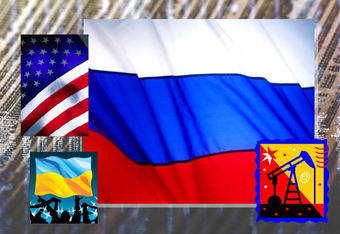
Russian Markets Rebound
| Published March 27, 2014 |
By Thursday Review staff
Despite front page talk and U.S. President Barack Obama’s comments in Europe this week, Micex, the Russian stock market, has stabilized after its early and mid-March lows. At that time, two weeks ago, global investors and businesspeople were watching warily as the Ukrainian Crisis—which included a Russian invasion of Crimea and a subsequent annexation—loomed as both a major foreign policy challenge and a potential destabilizer of European markets, especially those dependent on Russian oil.
So confident in the power of economic sanctions was the President and top advisors, White House press secretary Jay Carney told reporters on March 18 that he wouldn’t recommend betting on the Russian markets, adding, “unless you were going short!”
At the time Carney’s market prediction seemed sound, but after a couple of weeks most worldwide investors seem to be betting that oil and gas resources in Vladimir Putin's Russia are enough to keep the economy moving forward despite a rough first round of sanctions.
Those sanctions currently include limitations on bank transactions, frozen assets, and a punishing set of restrictions on some of Putin’s billionaire cronies in both Russia and the Ukraine. Thirty-one Russians have had visa bans imposed, and the European Union has included 51 individuals on its blacklist for travel and finance.
Further, the G8 group of industrialized nations voted unanimously this week to expel Putin from the roundtable, making it effectively the G7. Plans to hold their spring summit in Sochi, Russia were scuttled in favor of meeting instead in Brussels in June.
Economic experts and business leaders are divided on whether the sanctions will have any real long-term effect on Putin or the Russian markets, especially in an increasingly interconnected global economy, and in an age of technological options which allow people to sneak around restrictions.
This week, the Russian markets actually experienced a rebound after months of declines. Many Russian stocks reached extreme lows two weeks ago, but now those same stocks are proving tempting to investors who see a bargain. Others may sense that the crisis may be receding.
Still, much could change. Putin has massed even more troops along the long border between Russia and the Ukraine, and though the Kremlin has consistently characterized the military movements as “an exercise,” the troop concentrations have some of the largest in decades and have many military analysts concluding that Putin may have territorial designs on more than Crimea.
Both the U.S. and the E.U. are considering more sanctions against Russia. In the U.S., the Senate has authorized an aid package for Ukraine—legislation which includes $150 in direct cash assistance and roughly $1 billion is loan guarantees. Down the hall, the House of Representatives voted to impose additional sanctions, including more frozen assets and addition bans on travel for top Russian executives and government officials.
In the meantime, with many Visa and MasterCard transactions halted for business in (or with) Russian banks and financial institutions, Putin declared to his government that it was time for Russia to develop its own network for payments and credit card activity. Several of the biggest Russian banks are owned by close political associates of Putin, individuals who have been slapped with some of the harshest components of the sanctions.
Related Thursday Review articles:
Dangerous Chess Match: Obama Versus Putin; R. Alan Clanton; Thursday Review; March 25, 2014.
